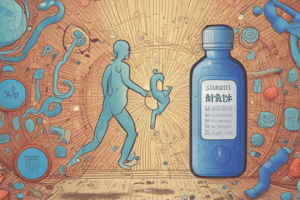Podcast
Questions and Answers
What is the primary cause of high blood sugar levels in Type 1 Diabetes?
What is the primary cause of high blood sugar levels in Type 1 Diabetes?
- Lack of physical activity
- Hormonal changes during pregnancy
- Autoimmune response against insulin-producing beta cells (correct)
- Insulin resistance
Which type of diabetes is characterized by insulin resistance and may eventually require insulin therapy?
Which type of diabetes is characterized by insulin resistance and may eventually require insulin therapy?
- Autoimmune Diabetes
- Type 1 Diabetes
- Type 2 Diabetes (correct)
- Gestational Diabetes
What is the typical outcome of Gestational Diabetes after pregnancy?
What is the typical outcome of Gestational Diabetes after pregnancy?
- It always leads to Type 2 Diabetes later in life
- It typically resolves after pregnancy (correct)
- It never goes away and requires lifelong insulin therapy
- It persists for the rest of the woman's life
What is the main difference between Type 1 Diabetes and Type 2 Diabetes?
What is the main difference between Type 1 Diabetes and Type 2 Diabetes?
What is the underlying pathophysiology of Gestational Diabetes?
What is the underlying pathophysiology of Gestational Diabetes?
What is a common symptom of diabetes that is related to the eyes?
What is a common symptom of diabetes that is related to the eyes?
What is a type of diabetes complication that affects the kidneys?
What is a type of diabetes complication that affects the kidneys?
What is a diagnostic test used to measure average blood sugar levels over the past 2-3 months?
What is a diagnostic test used to measure average blood sugar levels over the past 2-3 months?
What is a type of diabetes complication that affects the heart?
What is a type of diabetes complication that affects the heart?
What is a type of diabetes complication that affects the nerves?
What is a type of diabetes complication that affects the nerves?
Flashcards are hidden until you start studying
Study Notes
Diabetes
Definition
- A group of metabolic disorders characterized by high blood sugar levels due to impaired insulin secretion, insulin action, or both.
Types of Diabetes
- Type 1 Diabetes (T1D)
- Autoimmune disease: body's immune system attacks and destroys insulin-producing beta cells in the pancreas.
- Insulin deficiency: requires insulin therapy to control blood sugar levels.
- Type 2 Diabetes (T2D)
- Insulin resistance: body's cells become resistant to insulin, leading to high blood sugar levels.
- Insulin deficiency: may eventually require insulin therapy, but can often be managed with lifestyle changes and/or oral medications.
- Gestational Diabetes (GDM)
- Develops during pregnancy, usually in the second or third trimester.
- Caused by hormonal changes and insulin resistance.
- Typically resolves after pregnancy, but increases the risk of developing T2D later in life.
Symptoms of Diabetes
- Common symptoms
- Increased thirst and hunger
- Frequent urination
- Fatigue
- Blurred vision
- Less common symptoms
- Slow healing of cuts and wounds
- Tingling or numbness in the hands and feet
- Recurring skin, gum, or bladder infections
Complications of Diabetes
- Acute complications
- Diabetic ketoacidosis (DKA)
- Hypoglycemia (low blood sugar)
- Chronic complications
- Cardiovascular disease
- Nephropathy (kidney disease)
- Retinopathy (eye disease)
- Neuropathy (nerve damage)
Diagnosis and Management
- Diagnostic tests
- Fasting plasma glucose (FPG) test
- Oral glucose tolerance test (OGTT)
- Hemoglobin A1c (HbA1c) test
- Management
- Lifestyle changes: healthy diet, regular exercise, weight loss
- Medications: oral medications, insulin therapy
- Monitoring: regular blood sugar checks, HbA1c tests
Studying That Suits You
Use AI to generate personalized quizzes and flashcards to suit your learning preferences.




